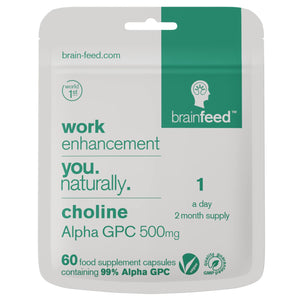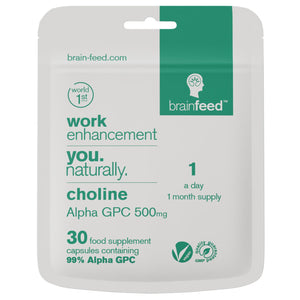Can Alpha GPC help you make better decisions?
filter
Let’s say you are scheduled for an interview for your dream job tomorrow at 9 am. You have been looking forward to this for a long time. You review your notes and complete practice questions (planning). You fight the urge to scroll through social media and go to bed early to get a good night’s rest (self-control). You set your alarm for 7:30 am to ensure enough time to get ready before the interview (time management). You arrive on time, and are presented with different tests including solving verbally presented scenarios and mental maths problems (attention, working memory). The interview lasted three hours but you powered through (perseverance). You got the job!
What are executive functions?
Planning, self-control, time management, attention, working memory and perseverance are different types of executive functions. These are the most advanced mental skills, unique to humans due to a highly evolved brain. Looking at the interview scenario, it is evident that to make better decisions at each stage of an important event/task, each of these skills are highly valuable.
What happens in the brain?
Humans are not born with these skills, and they must be taught and honed over time. The brain involves multiple sites and chemical messengers to develop executive functioning skills. The brain area that works like an executive functions’ supervisor, collecting messages from different parts and passing orders is located at the front of the brain. A specific brain chemical plays a major role in working memory and attention in this area. It is called acetylcholine. It is produced in the brain from a nutrient that can be obtained from the diet or supplements and must be present in adequate amounts for optimum brain levels. This nutrient is called choline and is required at every stage of life and is used for different purposes in the body. Low choline intake will lead to decreased acetylcholine which can impact advanced brain skills.
How can you get a steady supply of acetylcholine?
Choline can be consumed from protein rich foods like beef liver, eggs, almonds, and baked beans [1 Trusted Source 2018 - Nutrients Research evaluation Dietary Choline Intake: Current State of Knowledge Across the Life Cycle ] . For those with low intake of these foods, supplements can help increase choline available to make the brain chemical that impacts memory and attention. Alpha GPC is a supplemental form of choline that is better than other forms because the brain allows its free entry, and it is 40% choline by weight which is double than provided by other supplements. Brain feed has created the world’s 1st 500mg Alpha GPC capsule containing 99% Alpha GPC* (the purest form of Alpha GPC).
How does acetylcholine impact working memory?
Working memory is used when you need to remember and process information over a short period of time, for instance, when a scenario is read out in an interview, your working memory is needed to remember the details and process them to respond with a solution. Removal of acetylcholine from brains of animals caused impairment of working memory [2 Trusted Source 2021 - Neuropsychopharmacology Systematic and meta-analysis Neuromodulation of prefrontal cortex cognitive function in primates: the powerful roles of monoamines and acetylcholine ] . Use of alpha GPC for memory functions is connected to its role in increasing acetylcholine. Research tells us that choline supplementation can help improve working memory, in healthy as well as those with alcohol-damaged brains [3 Trusted Source 2017 - Nutrients Animal study Choline and Working Memory Training Improve Cognitive Deficits Caused by Prenatal Exposure to Ethanol ] . A group of over 1000 participants studied for 7 years revealed that those with higher choline intake had better working memory [4 Trusted Source 2011 - The American Journal of Clinical Nutrition Human study The relation of dietary choline to cognitive performance and white-matter hyperintensity in the Framingham Offspring Cohort ] . Since working memory is heavily influenced by acetylcholine levels, adequate choline intake can help improve working memory.
How does acetylcholine impact attention?
Attention is another executive function needed for most day-to-day tasks, whether it be driving through a new city or solving a puzzle. The extensive acetylcholine cell network at the front of the brain is directly involved in attention tasks, by activating different areas to help you focus on important details while ignoring distractions. Research found that a high amount of this brain chemical was released in brains of animals tested on attention tasks and toxins that damaged acetylcholine cells caused decrease in attention needed to complete tasks correctly [5 Trusted Source 2011 - Behavioural Brain Research Research evaluation Acetylcholine and attention ] . Studies on Alpha GPC found an increase in attention scores in those supplemented [6 Trusted Source 2001 - Mechanisms of Ageing and Development Systematic and meta-analysis Choline alphoscerate in cognitive decline and in acute cerebrovascular disease: an analysis of published clinical data ] . Maintaining optimal levels of acetylcholine is essential to improve concentration.
How can you improve your memory and attention?
Magical attention or memory supplements that can turn you into a superhuman are yet to be created. In the meantime, you can provide your brain with adequate choline to help it optimise memory and attention. There are also some lifestyle changes you can make to improve memory and concentration. Getting regular exercise, associating new items with familiar ones, using mnemonics and acronyms, using mind maps and visual cues can help you remember things better. Focusing on one task at a time, creating a distraction free space, taking short breaks between tasks, and getting regular sleep can help you become more attentive.
References
- Wiedeman, A.M. et al. (2018). Dietary Choline Intake: Current State of Knowledge Across the Life Cycle. Nutrients, [online] 10(10). https://www.mdpi.com/2072-6643/10/10/1513
- Cools, R. et al. (2021). Neuromodulation of prefrontal cortex cognitive function in primates: the powerful roles of monoamines and acetylcholine. Neuropsychopharmacology, 47(1), pp.309–328. https://www.nature.com/articles/s41386-021-01100-8
- Waddell, J. et al. (2017). Choline and Working Memory Training Improve Cognitive Deficits Caused by Prenatal Exposure to Ethanol. Nutrients, 9(10). https://www.mdpi.com/2072-6643/9/10/1080
- Poly, C. et al. (2011). The relation of dietary choline to cognitive performance and white-matter hyperintensity in the Framingham Offspring Cohort. The American Journal of Clinical Nutrition, [online] 94(6), pp.1584–1591. https://www.sciencedirect.com/science/article/pii/S0002916523025042?via%3Dihub
- Klinkenberg, I. et al. (2011). Acetylcholine and attention. Behavioural brain research, [online] 221(2), pp.430–42. https://www.sciencedirect.com/science/article/abs/pii/S0166432810007588?via%3Dihub
- Parnetti, L. et al. (2001). Choline alphoscerate in cognitive decline and in acute cerebrovascular disease: an analysis of published clinical data. Mechanisms of Ageing and Development, 122(16), pp.2041–2055. https://www.sciencedirect.com/science/article/abs/pii/S0047637401003128?via%3Dihub


 alertness
alertness
 cognition
cognition
 sleep
sleep
 wellbeing
wellbeing









Leave a comment
Open tab